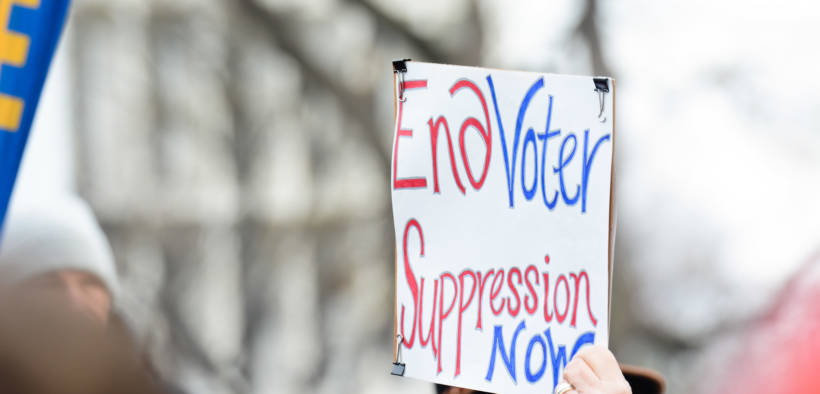Crucial House Vote Could Put Teeth Back into Voting Rights Act

The Voting Rights Advancement Act of 2019 could restore one of the most powerful provisions of the original 1965 Voting Rights Act, but must first pass an upcoming vote in the House.
In 2013 the Supreme Court case Shelby County v. Holder dealt a devasting blow to voting rights advocates by nullifying one of the key provisions of the landmark 1965 Voting Rights Act. Now, the U.S. House of Representatives is expected to vote as soon as Friday on H.R. 4, the Voting Rights Advancement Act of 2019 which its proponents say will rectify the damage done and the attack on voting rights ushered in after the court’s 2013 decision.
Preclearance and the Voting Rights Act
The key issue at play is the issue of “preclearance.” Sections 4 and 5 of the 1965 Voting Rights Act established a federal preclearance process which required “locations with the worst records of voting discrimination to federally ‘preclear’ — or get federal approval for — voting changes by demonstrating to either the Justice Department or the D.C. federal court that the voting change would not have a discriminatory purpose or effect,” as the ACLU explained.
The preclearance process meant states or municipalities with a history of voter suppression would now be required to prove that any new changes to voting laws, such as requiring voter ID, did not discriminate based on race. According to the ACLU, the preclearance requirement was one of the most powerful aspects of the Voting Rights Act and was a crucial preemptive stop to voter suppression.
“Since its enactment in 1965, Section 5 has had a massive impact in dismantling voting discrimination — the biggest of any congressional action — successfully blocking more than 1,000 instances of discriminatory election rules advanced by state and local officials,” wrote the ACLU.
But Shelby County v. Holder struck down Section 4 of the Voting Rights Act which established a formula for identifying which locations had the worst records of racial discrimination and were thus subject to Section 5’s preclearance requirement. In the majority opinion, the judges ruled that Congress needed to adopt a new formula for determining what locations were subject to the preclearance requirement.
But now the Voting Rights Advancement Act of 2019, introduced by U.S. Rep. Terri Sewell (AL-07) and Sen. Patrick Leahy (D-VT), seeks to restore the preclearance requirement by establishing a new and updated preclearance formula that would once again identify locations with problematic racial discrimination, thus subjecting them to again preclear any changes in voting laws.
The new preclearance formula states, “A state and all of its political subdivisions shall be subject to preclearance of voting practice changes for a 10-year period if (1) 15 or more voting rights violations occurred in the state during the previous 25 years; or (2) 10 or more violations occurred during the previous 25 years, at least one of which was committed by the state itself. A political subdivision as a separate unit shall also be subject to preclearance for a 10-year period if three or more voting rights violations occurred there during the previous 25 years.”
Shelby County Undermines Right to Vote
According to the ACLU and the Voting Rights Advancement Act’s sponsors, the court’s 2013 decision in Shelby County v. Holder ushered in an era of new voter suppression laws across the country.
“States that used to be covered by preclearance, and even those with less deplorable records, took the Shelby decision as a signal to enact voting restrictions with impunity, and the flood gates were opened to voting discrimination unlike anything the country had seen in a generation. A squall of voting restrictions was advanced on a national scale, including: photo ID laws, restraints on voter registration, voter purges, cuts to early voting, restrictions on the casting and counting of absentee and provisional ballots, documentary proof of citizenship requirements, polling place closures and consolidations, and criminalization of acts associated with registration or voting,” writes the ACLU.
A report released by the House Administration Subcommittee on Elections on the state of voting in the U.S. after the Shelby County decision backs the ACLU’s claims and found that Shelby County “fundamentally undermined the manner in which voting rights are protected and enforced across America.”
“Shelby County opened the door for a new generation of voter suppression. Its effects were sudden.
“Hours after Shelby County, Texas revived a previously blocked voter ID law. Within days, Alabama announced it would move to enforce a photo ID law it had previously refused to submit to the Department of Justice for preclearance. Within months, New York broke from past practices and declined to hold special elections to fill 12 legislative vacancies, denying 800,000 voters of color representation,” adds the subcommittee’s report.
A Wakeup Call
The Voting Rights Advancement Act of 2019 would also establish a new preliminary injunction standard so that any potentially discriminatory voting changes would be unenforceable until a lawsuit alleging discrimination is settled. The act also requires locations to notify the public of any voting changes prior to elections and would give the Department of Justice the authority to send observers to monitor elections.
“The election of 2016 was a wakeup call. Voters were threatened and given false information. Hundreds of thousands of voters were purged from the rolls all over the country. People who had voted for decades were turned away from the polls. What happened? It was the first election in over 50 years without the protection of the Voting Rights Act,” the Rep. John Lewis said. “We must repair what the Supreme Court damaged. We must pass this bill to ensure that every American has equal freedom to participate in our democracy.”









